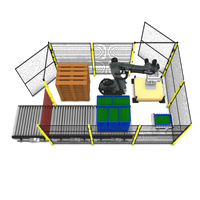Key Performance Indicators (KPIs) play a critical role in improving operational efficiency by providing a clear and quantifiable way to measure, monitor, and manage various aspects of an organisation’s performance. Here’s how KPIs contribute to operational efficiency improvement:
- Measuring Progress: KPIs provide a standardised way to measure the performance of specific processes, departments, or the organisation as a whole. They create a baseline for assessing the current state of operations.
- Setting Targets and Goals: KPIs help in setting specific, achievable targets and goals. When employees and teams have clear objectives, it motivates them to work more efficiently toward those objectives.
- Identifying Inefficiencies: KPIs can highlight areas of inefficiency or underperformance. When certain KPIs fall below target levels, it signals that improvements are needed in those areas.
- Prioritising Improvement Initiatives: KPIs allow organisations to prioritise their improvement efforts. By identifying which processes or areas have the most significant impact on key goals, resources can be allocated more effectively.
- Real-time Monitoring: Many KPIs are monitored in real-time or on a regular basis, providing immediate feedback. This allows for quick responses and corrections when performance deviates from the desired levels.
- Accountability: KPIs make individuals and teams accountable for their performance. When people know that their performance is being measured, they tend to work more diligently to achieve the set targets.
- Data-Driven Decision-Making: KPIs provide objective data that can guide decision-making. This helps organisations make informed choices about resource allocation, process improvements, and strategic direction.
- Continuous Improvement: KPIs are closely tied to the concept of continuous improvement. By tracking performance over time, organisations can make iterative changes to processes, leading to increased efficiency.
- Alignment with Strategic Goals: KPIs should be aligned with an organisation’s strategic objectives. This ensures that operational efforts are directed towards achieving the overall mission and vision of the organisation.
- Clear Communication: KPIs help communicate performance data effectively across all levels of the organisation. This transparency ensures that everyone is on the same page regarding what is important for the organisation’s success.
- Efficiency Benchmarking: KPIs often involve benchmarking against industry standards or competitors. This comparison can reveal where the organisation stands relative to peers and where improvements are needed.
- Customer Focus: Some KPIs, such as customer satisfaction or Net Promoter Score (NPS), directly measure how well the organisation is meeting customer needs. This customer-centric focus can drive operational improvements aimed at enhancing customer satisfaction.
- Resource Optimization: KPIs can guide resource allocation decisions. If certain processes are underperforming, resources can be reallocated or invested in those areas to improve efficiency.
As you can see, KPIs are a vital tool for improving operational efficiency because they provide a clear, data-driven framework for assessing and managing performance. They help organisations identify areas in need of improvement, set clear objectives, and track progress, ultimately driving efficiency enhancements and better overall performance.
Find out more…








Warning: Undefined variable $aria_req in /var/www/granta-automation.co.uk/news/wp-content/themes/twentyten/comments.php on line 81
Warning: Undefined variable $aria_req in /var/www/granta-automation.co.uk/news/wp-content/themes/twentyten/comments.php on line 86